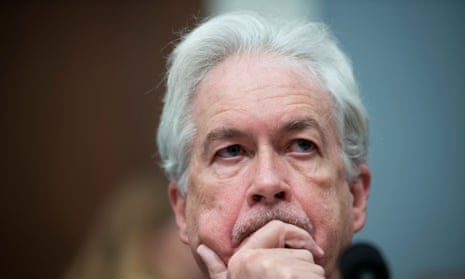Key events Show key events only Please turn on JavaScript to use this feature
Russia ‘risks becoming economic colony of China’ as isolation deepens, says CIA director
Russia risks becoming an “economic colony” of China as its isolation from the West deepens after the invasion of Ukraine, CIA Director William Burns said on Tuesday.

“Russia is becoming more and more dependent on China and, in some respects, runs the risk of becoming an economic colony of China over time, dependent for export of energy resources and raw materials,” Burns said at an event at Rice University in Houston.
Opening summary
Welcome back to the Guardian’s live coverage of the war in Ukraine with me, Helen Sullivan.
Our top story this morning: Russia risks becoming an “economic colony” of China as its isolation from the West deepens following the invasion of Ukraine, CIA Director William Burns said on Tuesday.
More on this shortly. Here are the other key recent developments:
US intelligence reportedly warned Ukraine in February that it might fail to amass sufficient troops and weaponry for its planned spring counter-offensive, and might fall “well short” of Kyiv’s goals for recapturing territory seized by Russia, according to a trove of leaked defence documents.
The same leaked US military documents indicate that the UK has deployed as many as 50 special forces to Ukraine. The documents suggest that more than half of the western special forces personnel present in Ukraine between February and March this year may have been British. It is unclear what activities the special forces may have been engaged in or whether the numbers of personnel have been maintained at this level.
The US intelligence documents appear to indicate that Egypt was planning to covertly supply Russia with rockets and munitions. A document dated 17 February is claimed to summarise conversations between President Abdel Fatah al-Sisi and senior Egyptian military officials in which Sisi instructs officials to keep the production and shipment of rockets secret “to avoid problems with the west”.
Ukraine needs more long-range weapons and “less contemplation on leaks”, said the senior presidential adviser, Mykhailo Podolyak, referring to the recent leak of Pentagon documents.
No ships were inspected on Tuesday under the Ukraine Black Sea grain deal “as the parties needed more time to reach an agreement on operational priorities,” the United Nations said, adding that routine inspections were due to resume on Wednesday.
A spokesperson for the Ukrainian armed forces has denied a claim by Yevgeny Prigozhin, the head of Russia’s private Wagner mercenary group, who said Russian forces now controlled more than 80% of Bakhmut city. “I can confidently state that the Ukrainian defence forces control a much larger percentage of the territory of Bakhmut,” Serhii Cherevatyi said.
The World Bank is ready to play its role in rebuilding Ukraine after the devastation of Russia’s invasion, but the numbers are too large for international financial institutions alone and western European countries will have to chip in, World Bank President David Malpass said on Tuesday.
US secretary of state Antony Blinken said on Tuesday Russia’s detention of Evan Gershkovich would “do even more damage to Russia’s standing around the world.” The Kremlin, appearing to pre-judge any judicial hearing, said on Tuesday that the Wall Street Journal reporter Evan Gershkovich had “violated Russian law” and been caught “red-handed”, after the US state department officially designated him as having been “wrongfully detained” by Russia.
Brazilian President Luiz Inácio Lula da Silva left for China, where he aims to convince President Xi Jinping to form a group of nations to mediate an end to the war.
Russia’s lower house of parliament has voted unanimously to introduce electronic callup papers via an online portal for the first time. The State Duma gave its preliminary approval to changes in the law that are intended to facilitate mobilisation, as Russia seeks to make it harder to avoid the draft. Changes to the legislation would mean that once an electronic summons is received, citizens who fail to show up at the military enlistment office are automatically banned from travelling abroad.
Russia may see a sharply wider budget deficit and a smaller current account surplus this year, while global isolation and lower energy revenues dampen economic growth for years to come, the IMF said.
Hungary’s foreign minister, Péter Szijjártó, has announced new agreements to ensure the country’s continued access to Russian energy, a sign of the country’s continuing diplomatic and trade ties with Moscow amid the war in Ukraine.
The Russian-appointed leader of Crimea has said Moscow’s forces are ready for a possible Ukrainian assault, days after President Volodymyr Zelenskiy reaffirmed Kyiv’s intention to take back the Black Sea peninsula that Russia illegally annexed from Ukraine in 2014.
Almost 8,500 civilians are confirmed to have been killed in Russia’s invasion of Ukraine, a UN body has said, with many thousands more unverified deaths feared. The Office of the UN high commissioner for Human Rights (OHCHR) has described its figures as “the tip of the iceberg” because of its limited access to battle zones.
A Danish decision on whether to supply western fighter jets to Ukraine is likely to take place “before the summer”, Denmark’s acting defence minister, Troels Lund Poulsen, has said. Discussions are taking time because countries have to act together, Poulsen said during a visit to Ukraine.
Canada’s prime minister, Justin Trudeau, has pledged fresh military support for Ukraine after meeting with his Ukrainian counterpart, Denys Shmyhal. Canada will send 21,000 assault rifles, 38 machine guns and 2.4m rounds of ammunition to Ukraine and impose sanctions on 14 Russian individuals and 34 entities.

 1 year ago
61
1 year ago
61










 English (US)
English (US)